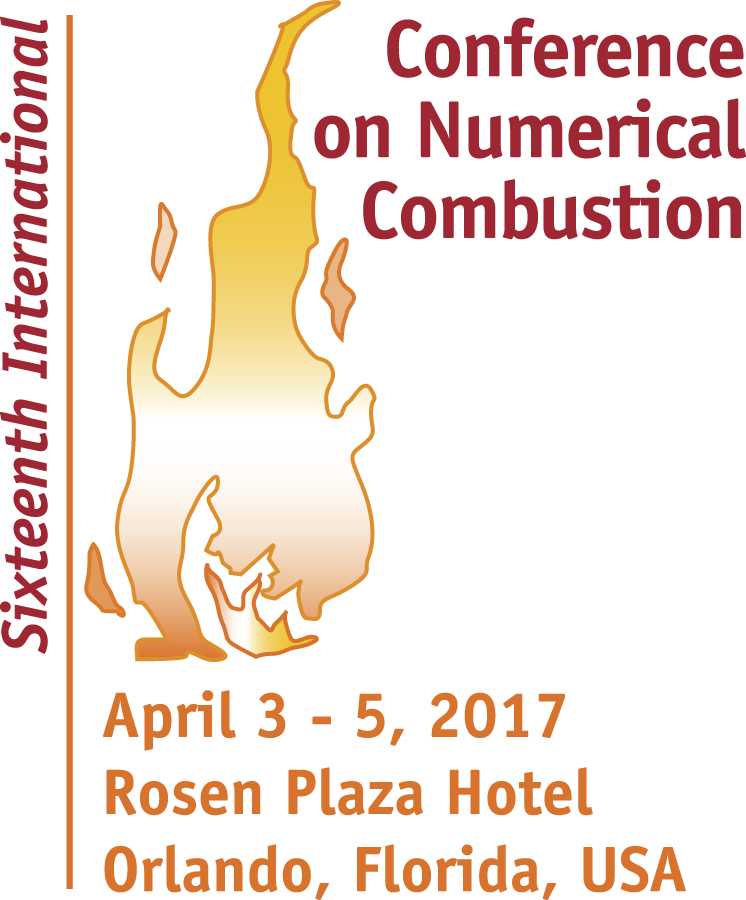16th International Conference on Numerical Combustion

https://www.facebook.com/events/1724156957868970/.
Statement on Inclusiveness
As a professional society, SIAM is committed to providing an inclusive climate that encourages the open expression and exchange of ideas, that is free from all forms of discrimination, harassment, and retaliation, and that is welcoming and comfortable to all members and to those who participate in its activities. In pursuit of that commitment, SIAM is dedicated to the philosophy of equality of opportunity and treatment for all participants regardless of gender, gender identity or expression, sexual orientation, race, color, national or ethnic origin, religion or religious belief, age, marital status, disabilities, veteran status, field of expertise, or any other reason not related to scientific merit. This philosophy extends from SIAM conferences, to its publications, and to its governing structures and bodies. We expect all members of SIAM and participants in SIAM activities to work towards this commitment.
Announcements
To RSVP to the conference on Facebook and connect with other attendees, find roommates etc., please visit https://www.facebook.com/events/1724156957868970/.
If you are tweeting about the conference, please use the designated hashtag to enable other attendees to keep up with the Twitter conversation and to allow better archiving of our conference discussions. The hashtag for this meeting is #SIAMNC17. SIAMвҖҷs Twitter handle is @TheSIAMNews.
Organizing Committee
Co-Chairs
Mitchell D. Smooke, Yale University, USA
D. Scott Stewart, University of Illinois, Urbana-Champaign, USA
Charles Westbrook, Lawrence Livermore National Laboratory, USA
Steering Committee
Stewart Cant, University of Cambridge, United Kingdom
Jackie Chen, Sandia National Laboratories, USA
Vincent Giovangigli, Ecole Polytechnique, France
Ulrich Maas, Karlsruhe Institute of Technology, Germany
Elaine Oran, University of Maryland, USA
Denis Veynante, Ecole Centrale Paris, France
Description
The Society for Industrial and Applied Mathematics (SIAM) invites you to participate in the International Conference on Numerical Combustion, April 3-5, 2017 in Orlando, Florida, USA. This conference follows a series of conferences held in Sophia Antipolis, France (1985), San Francisco, California (1987), Juan les Pins, France (1989), St. Petersburg Beach, Florida (1991), Garmisch, Germany (1993), New Orleans, Louisiana (1996), York, England (1998), Amelia Island, Florida (2000), Sorrento, Italy (2002), Sedona, Arizona (2004), Granada, Spain (2006), Monterey, California (2008), Corfu, Greece (2011), San Antonio, Texas (2013), and Avignon, France (2015). The conferences held in the United States are organized by SIAM.
Advances in computational algorithms, hardware, and software continue to have a revolutionary impact on the combustion sciences and permit the examination of scientific and engineering problems of increasing complexity. Detailed combustion simulations and models are now being considered as part of integrated system applications. The International Conference on Numerical Combustion will focus on the integration of theory, modeling, and numerical implementation in the study of basic combustion physics and technological applications. The distinct questions and challenges found in combustion and phase transitions arise from the multiplicity of length and time scales defined by the chemical, geometric, and flow ingredients. Physically descriptive, efficient, and accurate numerical modeling of complex phenomena and the design and implementation of complex, integrated simulation are the challenges to be addressed at this conference.
Funding Agency
SIAM and the Conference Organizing Committee wish to extend their thanks and appreciation to the DOE Office of Advanced Scientific Computing Research for its support of this conference.
Themes
The themes of the conference include, but are not limited to:
- Combustion dynamics and instabilities
- Detonation, explosions
- Droplets and spray
- Emissions and pollution
- Fires
- Gas turbine, engine and furnace combustion
- Heterogeneous combustion
- High-performance computing of combustion applications
- Ignition, quenching
- Kinetics, mechanism reduction
- Laminar flames
- Material synthesis
- Micro-combustion
- New combustion technologies (flameless combustion, clean coal technologies,...)
- Numerical methods for reacting flows and complex chemistry
- Real gases, supercritical combustion
- Turbulent combustion
- Software engineering for combustion applications, code coupling
- Supersonic combustion
















